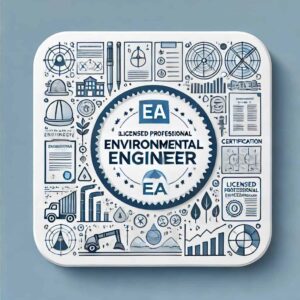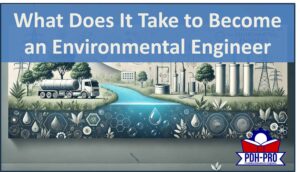Contributor: Jordan Ellis
Environmental engineers play a vital role in safeguarding our planet, blending creativity with technical expertise to solve some of the most pressing environmental challenges. From managing waste and pollution to ensuring clean air, soil, and water, their work has a direct impact on the health of ecosystems and communities.
Whether you’re a student curious about the field or an experienced engineer looking to expand your expertise, this article will guide you through the path to becoming an environmental engineer, shedding light on the career’s demands, opportunities, and rewards.
Related Articles:
What Does It Take to Become a Chemical Engineer
What Does It Take to Become an Electrical Engineer
What Do Environmental Engineers Do?
Table of Contents
Environmental engineers are responsible for designing and implementing solutions that protect our natural resources. Their work spans across managing waste treatment, controlling pollution, and ensuring that water, air, and soil remain safe for public use. They also play a crucial role in developing strategies to comply with environmental regulations, often working closely with scientists, regulatory agencies, and industries.
Engineering is a cornerstone of modern society, contributing to the advancement of many critical systems. Learn more about why engineering is so important here.
Educational Requirements for Environmental Engineers
To become an environmental engineer, a bachelor’s degree in environmental engineering or a related field, such as civil or chemical engineering, is essential. Most programs combine theoretical coursework with practical lab experiences and internships.
For those seeking to advance into specialized roles, a master’s degree may be required, especially in areas like environmental policy or advanced system design. Internships and research projects during school are crucial for gaining hands-on experience and preparing for the diverse challenges of the profession.
How to Become a Licensed Professional Environmental Engineer
Obtaining a Professional Engineer (PE) license is a critical step for environmental engineers who wish to advance their careers and take on more responsibility. The path typically includes:
- Earn a bachelor’s degree: Graduating from an ABET-accredited engineering program is required.
- Pass the Fundamentals of Engineering (FE) Exam: This is often taken right after graduation.
- Gain Work Experience: Accumulate at least 4 years of supervised work.
- Pass the PE Exam: After gaining experience, passing the PE exam in your discipline is the final step.
Licensure allows engineers to sign off on projects, lead teams, and ensure compliance with environmental regulations.
Environmental Engineer Salaries and Earning Potential
Environmental engineers are well-compensated for their expertise in managing natural resources and addressing environmental challenges. The median annual salary for environmental engineers in the U.S. is around $105,000, but earnings can vary based on factors like experience, location, and industry.
Engineers working in sectors like chemical manufacturing or oil pipeline transportation often earn more. Additionally, earning a PE license can significantly boost your earning potential, as it allows you to take on more advanced projects and leadership roles.
The following table lists the average annual salaries for environmental engineers at various levels.
| Job Title | Average Annual Salary (USD) |
| Entry-Level Environmental Engineer | $ 70,000.00 |
| Mid-Level Environmental Engineer | $ 90,000.00 |
| Senior Environmental Engineer | $ 115,000.00 |
| Environmental Engineering Manager | $ 130,000.00 |
| Environmental Engineer with PE License | $ 120,000.00 |
Check out this video about Environmental Engineers.
Continuing Education for Environmental Engineers
Staying up-to-date with the latest industry trends, regulations, and technologies is crucial for environmental engineers. Whether you’re looking to enhance your expertise or maintain your professional licensure, our environmental engineering courses offer a wide range of opportunities.
With over 40 courses available, you can choose from live webinars, recorded webinars, and self-directed courses that fit your schedule and learning style. These courses cover essential topics, from pollution control to environmental impact assessments, helping you remain at the forefront of this dynamic field.
Career Path and Advancement Opportunities
Environmental engineers have a dynamic career path with plenty of room for growth and specialization. Starting as an entry-level engineer, you’ll likely focus on designing and implementing solutions for pollution control, water treatment, or waste management. As you gain experience, you can advance to mid-level or senior positions, where you’ll take on larger projects and more complex environmental challenges.
Achieving a Professional Engineer license opens the door to leadership roles, such as environmental engineering manager or project lead, where you’ll oversee teams and guide project direction. Specializing in areas like air quality, sustainability, or regulatory compliance can further elevate your career. Additionally, engineers with advanced degrees or certifications often move into consulting roles, policy development, or executive positions in both private and public sectors.
Continued learning through professional development and continuing education courses is key to advancing in this evolving field.
Conclusion
Becoming an environmental engineer offers a rewarding career that combines technical expertise with a passion for protecting the environment. With the right education, licensure, and commitment to ongoing learning, you can make a meaningful impact while advancing in a field full of opportunity. Whether you’re just starting or looking to grow, continuing education is essential for staying current and unlocking new career possibilities.

